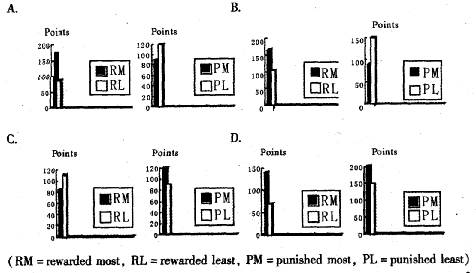题目内容
What can be found in the two recent studies?
One showed that adults are much more cooperative if they work in a system based on rewards.Researchers at Harvard University in the United States and the Stockholm School of Economics in Sweden did the study, which appeared last month in the journal Science.They had about two hundred college students play a version of the game known as the Prisoner's Dilemma.The game is based on the tension between the interests of an individual and a group.The students played in groups of four.Each player could win points for the group, so they would all gain equally.But each player could also reward or punish each of the other three players, at a cost to the punisher.Harvard researcher David Rand says the most successful behavior proved to be cooperation (合作).The groups that rewarded most earned about twice as much in the game as the groups that rewarded least.And the more a group punished itself, the lower its earnings.The group with the most punishment earned twenty-five percent less than the group with the least punishment.
The other study referred to children, which was presented last month in California at a conference on violence and abuse.Researchers used intelligence tests given to two groups.More than eight hundred children were ages two to four the first time they were tested.More than seven hundred children were ages five to nine.The two groups were retested four years later, and the study compared the results with the first test.Both groups contained children whose parents used physical punishment and children whose parents did not.The study says the IQs ?or intelligence quotients—of the younger children who were not spanked were five points higher than those who were.In the older group, the difference was almost three points.Murray Strauss from the University of New Hampshire' worked with Mallie Paschall from the Pacific Institute for Research and Evaluation.Professor Strauss has written extensively about physical punishment of children.He says the more they are spanked, the slower their mental development.He also looked at average IQs in other nations and found them lower where spanking was more common.
72.We can learn from the passage that ____.
A.the first study began last month at Harvard University in America
B.the Prisoner's Dilemma is a game that can teach you how to be cooperative
C.the study on the IQs of children was carried out by Professor Murray Strauss
D.Professor Mallie has done lots of researches on family violence
73.What study method was adopted in the two recent studies according to the passage?
A.Observation. B.Questionnaire. C.Conclusion. D.Experiment.
74.The underlined word "spanked" in the third paragraph refers to ____.
A.scolded constantly B.punished physically
C.praised frequendy D.rewarded mentally
75.Which of the following charts is TRUE according to the passage?

小题1:B
小题2:D
小题3:B
小题4:A

练习册系列答案
相关题目
 someone cares, if someone cares about you, you take better care of yourself.
someone cares, if someone cares about you, you take better care of yourself. now friends D. how to name a place
now friends D. how to name a place